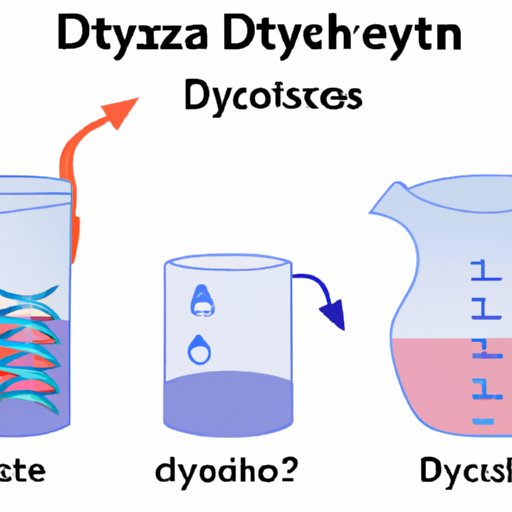Introduction
Dehydration synthesis, also referred to as condensation reaction, is a fundamental chemical reaction in biology that helps to create larger, complex molecules from smaller, simpler ones. This article aims to explore the chemistry of dehydration synthesis, its importance in biological systems, and practical applications of the process. We will also examine how dehydration synthesis is relevant to different biological processes, such as protein synthesis and polymerization.
The Chemistry of Dehydration Synthesis and its Importance in Biology: A Beginner’s Guide
Dehydration synthesis is a chemical reaction that involves the removal of a water molecule to form a new bond between two molecules. This process is called dehydration because the reaction results in the loss of a water molecule. In biological systems, dehydration synthesis is an important process for creating larger, more complex molecules such as carbohydrates, lipids, and proteins.
The importance of dehydration synthesis in biological systems cannot be overstated. The process is used to form a wide range of biological molecules such as glycogen, a storage form of glucose, and nucleic acids such as DNA and RNA which contain genetic information. Proteins are also formed through dehydration synthesis, where the amino acids are joined together to form long chains.
Understanding Dehydration Synthesis: How it Helps in Building Molecules
Dehydration synthesis is a process that helps to create more complex molecules by joining together smaller molecules through the removal of water. For instance, in the synthesis of a disaccharide, two monosaccharides undergo dehydration synthesis to form a glycosidic bond where a water molecule is removed. The glycosidic bond makes the disaccharide more stable and resistant to degradation.
The process of dehydration synthesis is important in creating complex molecules because it allows small molecules to come together to form a larger structure. By removing water molecules, the reaction becomes energetically favorable, consequently driving the reaction forward.
The Role of Dehydration Synthesis in the Formation of Polymers
Polymers are large molecules made by combining smaller monomers, linking them together by covalent bonds. These covalent bonds are created through the dehydration synthesis reaction – removing a molecule of water and linking the monomers together. Polymers are essential to biological systems and play important roles such as structural support in cells and allowing for the storage of energy.
A good example of a polymer formed from dehydration synthesis is cellulose. Cellulose has a linear structure made up of glucose monomers which undergo dehydration synthesis to form covalent glycosidic bonds. These bonds produce the stable structure of cellulose, making it a vital component of plant cell walls.
Dehydration Synthesis: A Process Crucial to Life
Dehydration synthesis is a process that is fundamental to life. It allows for essential biomolecules to be synthesized, which form the building blocks of life. The process also helps maintain homeostasis, which is the balance of biological processes in a living organism. Without homeostasis, intrinsic self-regulation of essential biomolecules would not be possible. In essence, dehydration synthesis plays a crucial role in the maintenance of life.
Synthesizing a New Understanding: The Significance of Dehydration Synthesis in Biochemistry
Biochemistry is a field concerned with the chemical processes within and relating to living organisms. The understanding of dehydration synthesis is significant in biochemistry as it helps to explain how biological molecules are formed and synthesized. The discovery of how dehydration synthesis functions in biological systems has led to the development of pharmaceutical drugs that target specific molecules in the body.
While the process of dehydration synthesis has been studied for many decades, there is still much to learn. Research on dehydration synthesis continues, and scientists are working to unravel the complexities associated with it.
Dehydration Synthesis and Hydrolysis: Exploring the Dynamic Relationship between Two Key Processes
Dehydration synthesis and hydrolysis are two processes that work together to maintain the balance of chemical reactions in biological systems. Hydrolysis is essentially the reverse of dehydration synthesis – instead of removing a water molecule, hydrolysis adds a water molecule to break down large molecules into smaller ones. Both processes are critical in the maintenance of homeostasis in organisms.
The dynamic nature of the relationship between dehydration synthesis and hydrolysis is essential in the breakdown and rebuilding of biomolecules. When a molecule is no longer required by an organism, it must be broken down through hydrolysis. Conversely, when a new molecule is needed, dehydration synthesis creates these new molecules.

Protein Synthesis: The Role of Dehydration Synthesis in Forming the Building Blocks of Life
Proteins are essential biomolecules that carry out a wide variety of functions in living organisms. From enzymes to structural support, proteins play critical roles in the human body. The synthesis of proteins is a complex process that involves dehydration synthesis.
Dehydration synthesis plays a fundamental role in the formation of polypeptide chains, which join to create proteins. Amino acids are joined together by peptide bonds through the loss of a water molecule to form a polypeptide chain. This chain of amino acids eventually folds to form a protein molecule that is essential to the structure and operation of the organism.
Conclusion
Dehydration synthesis is a fundamental process in biology that helps to generate large, complex molecules from simpler ones. The process is important in various biological systems, including carbohydrate and protein synthesis and the formation of polymers such as cellulose. Dehydration synthesis is crucial in maintaining homeostasis, the balance of biological processes in a living organism. The relationship between dehydration synthesis and hydrolysis is dynamic and complementary. Understanding dehydration synthesis is vital in the study of biochemistry and the creation of pharmaceutical drugs. As research on the topic continues, we can expect to learn more about the complexity of this process and its implications in the field of biology.
